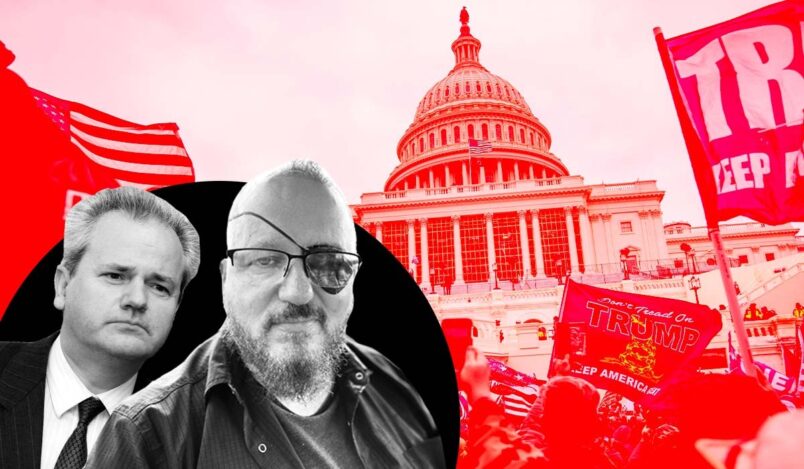Aleksandar Savic spoke to TPM about his interactions with the Oath Keepers and background.

TPM Illustration/Getty Images
LONG READ
By Josh Kovensky
January 18, 2022
Days after the November 2020 election, the Oath Keepers were preparing.
The group’s leader Stewart Rhodes had been warning of conflicts around the election — including a potential “civil war” — for months. But by Nov. 7, the day major news networks called the election for Biden, prosecutors allege, Rhodes had a plan.
The target was to be the U.S. Capitol. According to a federal grand jury indictment last week, Rhodes shared his plan to march on the Capitol after coming across a video titled “STEP BY STEP PROCEDURE, HOW WE WON WHEN MILOSEVIC STOLE OUR ELECTIONS.” It was a guide to overturning Joe Biden’s election, citing the model of the popular revolt which ended the rule of Slobodan Milosevic twenty years earlier.
Rhodes sent that video to a group of Oath Keepers, prosecutors say, and claimed to be in contact with the video’s creator who was advising his group with a plan of action.
Newsletters
An archived Nov. 11, 2020 version of the Oath Keepers’ website shows a letter from Rhodes embedded with the same video, thanking its creator, a “patriot from Serbia,” for “show[ing] us the way.”
TPM spoke on Monday with that “patriot from Serbia.” Now a Texas resident, the Serbian-born Aleksandar Savic discussed the video, his interactions with Rhodes, and his background. The news website MintPress first identified Savic as the creator of the video in January 2021.
Savic denied that his words incited violence.
“There are some very angry people citing other books, there are some people committing crimes from listening to rap songs,” Savic told TPM. “So, in lying that the one who is sending the words/message/whatever is solely responsible, is something that is not true.”
‘You Can Lose, Or You Can Fight’
The video, uploaded on Nov. 6, 2020 when Savic was still living in Europe, offers those upset by Trump’s defeat an “example” from Savic’s home country: Milosevic, Serbia’s autocratic leader in the 1990s, left power following the disputed 2000 election.
Irregularities in that election appeared to give Milosevic extra votes that put him over the top, resulting in mass demonstrations.
Workers went on strike, and protestors massed in Belgrade, eventually storming the country’s parliament. The same day, Milosevic resigned.
In the video, Savic likens the 2020 election in the U.S. to the 2000 election in Serbia, telling the audience: “When they declare their fake victory, you need to start massive civil disobedience.”
He also says explicitly that violence might be needed.
“This is what you must put in their hearts: They must feel fear. And while they are counting fake ballots, they must think about, are they going to get out of there alive?” Savic says. “Yes, I’m calling you for violence, if that is the only way. Who cares? Yes, I do. Here: taboo, broken.”
“We were in that situation,” Savic added. “You can lose, or you can fight.”
In the analogy, Milosevic is Biden: a usurper of the people’s will. An international tribunal found Milosevic responsible for genocide committed by Serb militias during the Bosnian War in the 1990s.
For the Oath Keepers, Savic’s video came at a pivotal moment on rollercoaster of emotion that Trump supporters went through that week. With the election held on Nov. 3 and the major news networks not calling the results until Nov. 7, Trump diehards were able to hold onto hope for the first few days.
By Nov. 5, when Savic released an initial, somewhat more vanilla video going over what he regarded as the historical parallels between Serbia 2000 and the U.S. 2020, hope was starting to fade that Trump would win.
It was in that climate of desperation that on Nov. 6 Savic posted a sequel: the “step-by-step” video that prosecutors cite as inspiring Rhodes’ plan of action for Jan. 6.
As that video progresses, video of Serbia in 2000 plays in the background. At one point, the text “TO THE CAPITAL!!!” appears. Towards the end, music — what Savic describes as a “Serbian march from World War I” — plays, while the video’s description notes: “we stormed the parliament.”
For Rhodes, Savic’s video captured what would be necessary to turn the tide against Biden, and a historical precedent in which the good guys won. Prosecutors say in the indictment that Rhodes told Oath Keepers on Nov. 7, one day after the video was published, that the group “must now do what the people of Serbia did when Milosevic stole their election. Refuse to accept it and march en-mass on the nation’s Capitol.”
The videos gained broader traction beyond Rhodes; Arizona GOP chair Kelli Ward appeared to cite it at a December 2020 rally in Phoenix — an incident first noted by MintPress. Ward asked a crowd: “How many of you saw the video of the guy from Serbia saying that their elections were stolen? And what did he say? If you lose now, you lose forever.”
Savic agreed to speak on the condition that both TPM and he make audio recordings of the conversation. In his conversation with TPM, Savic denied his video played any role in the actions that the Oath Keepers later took.
“That video of mine is nothing but recapitulation of the things that people already knew,” Savic told TPM. “In that video, I haven’t said anything particularly new. All I said was historical event that everybody can find on Wikipedia, that was factually more or less true.”
“It was said in such a voice that was reflecting my ethnic tradition of speaking orally, we are not very literal people [when] we are speaking our stories,” he continued. “Maybe that was super emotional, maybe that triggered some people, but that video is still on YouTube, so I still haven’t broken community standards of YouTube.”
“So implying that there is something spectacular there is a bit dishonest,” he added.
Equality Of Outcome
When he recorded the video, Savic had never been to the United States. He told TPM that he moved to Texas from Europe soon after — in early 2021.
Savic is a credentialed scientist with a PhD in physical chemistry. He worked as a researcher in academia and in the private sector in Europe before coming to the U.S.
“Before me, Tesla, the brightest mind ever, also chose America,” Savic said. “[Aleksandr] Solzhenitsyn came to America.”
Savic said he was born in Serbia in 1986, and he grew up as a straight-A student. But all around him, he said, were children earning lower grades than him, yet ending up with the same result.
To Savic, that was socialism — a focus on “equality of outcome,” a reason “why for the people who are individualistic like myself, America is the place to be.”
Savic left Serbia, living in France and Slovenia while working as a scientist.
By 2020, Savic had been gearing up to move to Austria: he would have his own lab there, he said — until “this whole madness with COVID started.”
“Seeing what is going to happen in Europe, it was something pretty biblical in my mind, that there is a flood coming,” Savic said. “And it is necessary to build an ark to put all the ideas into that ark to preserve them and go to some other land where the freedom still prevailed.”
‘Step by Step’
When TPM asked Savic why he made the video cited by federal prosecutors, Savic, in turn, cited Aleksandr Solzhenitsyn, the famed Soviet dissident writer and author of The Gulag Archipelago. He directed TPM to a Harvard lecture that Solzhenitsyn gave, and to his Nobel speech, titled “one word of truth shall outweigh the whole world.”
“With $200 budget in equipment, I decided to say something that all those sports stars, movie stars, … politicians, mainstream media, everybody — nobody wanted to say a word,” Savic said. “That year, everybody decided to be silent, and this was something that I was not capable of bearing on my shoulders.”
Savic posted two videos on BitChute, an alternative video sharing website that offers refuge to those who have been banned from YouTube, and which the ADL described in August 2020 as a “hotbed of hate.”
On Nov. 5, 2020, he uploaded his narrative of how Serbia contested its stolen elections.
The following day, he uploaded a “step by step” guide for Americans seeking to contest the election, including an aggressive call to action.
A YouTube user named Mrgunsandgear subsequently uploaded the first Savic video to YouTube on Nov. 6 where it garnered hundreds of thousands of views.
Prosecutors allege that Rhodes was inspired by the second, “step-by-step” video, which is only on BitChute.
The Oath Keepers
Savic told TPM that he reached out to Rhodes to thank him for sharing the video. MintPress also reported last year that Savic reached out to the Oath Keeper first.
He characterized his interaction as brief: In his telling, Rhodes asked, “are you really that guy?”
Savic purportedly replied, “yeah, I’m that guy.”
When TPM asked about the federal indictment, in which Rhodes said that he was “in contact” with Savic and that Savic had sent what he described as “written advice” on what to do, Savic maintained that he “recapitulated” what he had already said, and told TPM in a later email that Rhodes was “bragging” about their interactions.
He declined to share his emails with Rhodes with TPM, saying that it was a privacy issue and suggesting that providing those emails to a reporter might be a violation of the law.
“In every country in the world, there are laws about private, written communication,” Savic said. “It is as old as letters.”
Savic also said that if the government wanted access to his messages, they could have it — but, he said, he had not yet been contacted by the government.
Jan. 6
The Serbia-born scientist told TPM that he had not met Rhodes or any Oath Keepers in person since arriving in Texas, emphasizing that their contact was limited.
On Jan. 6, Savic said, he was “thousands of miles away, watching YouTube.”
When asked whether he thought there was legitimate cause to delay the certification of the election that day, Savic grew less strident.
“I have no idea what happened,” he said. “I don’t have enough information. As a scientist, without information, I cannot say anything. This is what I was trained for.”
Savic maintained that his message was its own, separate narrative, independent of Jan. 6; anyone who committed violent acts was misinterpreting his text, he said.
“It is the interpretive structure of other people, not of me,” he told TPM. “If there is something problematic in, for example, my video, then you can say the same that there is something … problematic in Quran, because there are some very angry people citing Quran.”

Josh Kovensky is an investigative reporter for Talking Points Memo, based in New York. He previously worked for the Kyiv Post in Ukraine, covering politics, business, and corruption there.
No comments:
Post a Comment